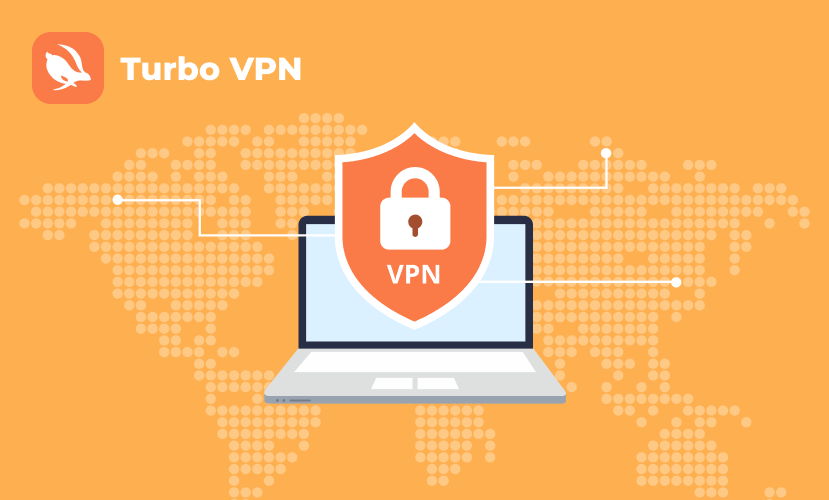Turbo VPN is one of the most downloaded free VPNs in app stores, especially popular in Asia and among mobile users looking for quick access to blocked sites. On the surface, it promises speed, simplicity, and free access to the open internet. But if you care about privacy, data protection, or transparency, this is not a VPN you can trust.
Having tested Turbo VPN again in 2025, my verdict remains unchanged: it may work for casual content unblocking, but it’s riddled with data logging, invasive permissions, and a complete lack of transparency about how it handles your traffic.
Quick Summary: Turbo VPN at a Glance
What I Like
- Free tier with no data cap
- Simple UI and quick connections
- Fast for basic web browsing and streaming
- Works in some restrictive networks like schools or workplaces
What I Don’t Like
- Aggressive tracking and analytics
- No true no-logs policy
- Based in China with questionable data handling practices
- No audits, no transparency reports
- VPN protocol is unclear; lacks user control
- In-app ads and push toward upsells
If you’re looking for a private or anonymous VPN in 2025, Turbo VPN is a poor choice despite its convenience and popularity.
Privacy & Security: A Glaring Weak Spot
Logging Policy (or Lack Thereof)
Turbo VPN claims to protect user privacy, but its actual practices tell a very different story:
- Logs IP address, connection timestamps, and device details
- Uses third-party analytics and advertising SDKs
- Offers no zero-logs guarantee
- Privacy policy is vague, contradictory, and contains concerning statements about “cooperation with law enforcement”
There is no independent audit, no open-source code, and no public record of transparency. Your data is essentially invisible once it leaves your device.
Based in China
Turbo VPN’s parent company (Innovative Connecting or Singapore-based firms connected to Chinese stakeholders) introduces geopolitical risk — especially since China is known for data-sharing laws and government surveillance.
Even if you’re not a high-risk user, this should raise serious red flags if you’re considering Turbo VPN for anything sensitive.
Features & Functionality: Barebones and Black Box
Turbo VPN focuses on speed and simplicity, but falls short on meaningful features.
Key (Limited) Features:
- Connect to “smart” servers (no manual location choice on free plan)
- In-app browser for private access (questionable security)
- Kill switch (premium only)
- Paid tier claims to support Netflix and global streaming
Missing or Underwhelming:
- No protocol selection (likely using insecure or proprietary tech)
- No DNS customization or leak protection
- No split tunneling
- No real transparency on how data is encrypted or routed
It’s essentially a black-box VPN app: it may route your data, but you have no idea how — and that’s dangerous.
User Experience: Fast, Polished, and Misleading
On the user experience front, Turbo VPN is very smooth — and that’s part of the problem. It feels trustworthy, but gives users very little insight or control.
Mobile Experience (Android/iOS)
- Extremely fast to set up
- Sleek UI with animations (the cartoon rabbit is memorable)
- Pushes free users toward premium aggressively
- Ads in the free version (some personalized)
Desktop Version
- Only available for premium users (Windows/macOS)
- Offers more servers, better speeds
- Still limited on settings and transparency
The experience is fast and user-friendly, but in exchange for user data, not real privacy.
Pricing & Payment Options: “Free” With a Data Cost
Turbo VPN is widely used because of its free version, which comes with no bandwidth cap. But just like most free VPNs, the cost comes in other forms: ads, tracking, and user profiling.
Free Plan
- Limited to a few vague “smart servers” (not geo-specific)
- In-app ads and promotions
- No encryption or protocol transparency
- Slower speeds, especially during peak times
- No kill switch or DNS leak protection
Premium Plan: Turbo VIP
The paid version unlocks more locations and removes ads, but it’s overpriced for what it delivers.
| Plan | Price |
|---|---|
| 1 Month | $11.99 |
| 6 Months | $6.67/month (billed $39.99) |
| 1 Year | $4.17/month (billed $49.99) |
Payment Options:
- Credit/debit cards
- Google Play / Apple subscriptions
- No cryptocurrency or anonymous payments supported
There’s a 30-day money-back guarantee, but it’s not always honored without hassle. No transparency on how your premium funds are used either.
Streaming, Torrenting & Censorship: Mixed Bag with Major Risks
Streaming Support
On the surface, Turbo VPN works for unblocking some region-locked content like:
- YouTube (various regions)
- Netflix (intermittently)
- BBC iPlayer (inconsistent)
- Disney+ (not reliably)
But during testing, speed drops and server crowding were major issues on the free plan. The premium servers are faster but still not consistent enough for HD or 4K streaming.
Torrenting? Avoid It.
Turbo VPN is not a good choice for torrenting:
- No clear stance on P2P support
- No kill switch = leak risk
- No port forwarding
- Weak/no encryption on the free plan
- You may expose your real IP during file sharing
If you torrent even occasionally, you’re far safer with services like Mullvad, IVPN, or Windscribe.
Censorship Resistance
Turbo VPN claims to help users in restricted regions like China, Iran, or UAE — and sometimes it does… briefly.
But it’s:
- Easily blocked by government firewalls
- Based in China (major risk)
- Lacking obfuscation tech (e.g., Shadowsocks, WireGuard with XOR, etc.)
- Not recommended for journalists, whistleblowers, or citizens in repressive regimes
For real censorship resistance in 2025, look toward VPNs with multi-hop routing, obfuscated servers, or open-source trust (e.g., Proton VPN or AirVPN).
Who Turbo VPN Is Best For
Turbo VPN may suit some people — but it’s important to be realistic about what you’re getting.
Ideal For:
- Users who want free, casual access to blocked websites
- People in schools, dorms, or workspaces with firewalls
- Those who need a temporary unblocker, not full encryption
- Beginners who want plug-and-play functionality
Not Ideal For:
- Journalists, researchers, or whistleblowers
- Torrenters
- Users dealing with censorship or surveillance
- Anyone who wants encryption or true anonymity
- People who want transparency about how their data is handled
Bottom line: If privacy is your priority, Turbo VPN shouldn’t be your tool.
Transparency & Ethics: Cloudy at Best
Transparency is where Turbo VPN takes one of its worst hits. There’s no third-party audit, no open-source code, and very little known about how user data is actually processed.
Logging & Privacy Policy
- Logs IP address, device info, network data, and usage metrics
- Shares data with third-party advertisers and analytics tools
- Based in a jurisdiction with state surveillance concerns
- No transparency reports or warrant canaries
Their privacy policy is deliberately vague, full of loopholes like:
“We may share personal data if required by law or for business transitions.”
Parent Company: Innovative Connecting
Although some materials list the company as Singapore-based, it’s closely tied to Chinese interests and infrastructure. This makes Turbo VPN especially risky for users in high-surveillance countries or with sensitive needs.
Final Verdict: Not Worth the Risk in 2025
Turbo VPN might be one of the most popular free VPNs, but when it comes to privacy and transparency, it’s closer to a data collection tool than a security product.
In testing, it delivered fast speeds, a simple UI, and occasional success with unblocking content — but those perks are overshadowed by serious concerns:
- Vague or misleading privacy practices
- Invasive tracking on the free version
- Based in a high-surveillance jurisdiction
- No audit, encryption details, or open protocol support
- Lacks real features like split tunneling, multi-hop, or DNS control
If you’re looking for security, anonymity, or long-term reliability, Turbo VPN is not a safe choice in 2025 — especially when better free and paid VPNs exist.
Final Score: 4.0/10 — Attractive at first glance, but deeply flawed beneath the surface. Use only if you’re aware of the risks — and only for low-stakes browsing.
Best Alternatives to Turbo VPN in 2025
If you’re thinking of uninstalling Turbo VPN (and you should, if privacy matters to you), here are safer, more transparent alternatives that protect your data without shady practices.
Mullvad VPN
- Zero logs, no account required
- Anonymous payment options (cash, crypto)
- Open-source apps and audited infrastructure
- Perfect for privacy maximalists
Proton VPN
- Based in Switzerland with strong legal privacy protections
- Audited and transparent
- Free plan with no ads, no logs
- Advanced features like Secure Core (multi-hop)
Windscribe
- Offers a strong free plan (up to 10GB/month)
- No-logs, transparent team
- Includes ad-blocking, split tunneling, and custom firewall
- Open about infrastructure and code
These VPNs are trusted, verified, and offer far more peace of mind than Turbo VPN ever will.
FAQs: Turbo VPN in 2025
Is Turbo VPN really free?
Yes — the basic version is free to download and use, but it comes at the cost of privacy through ads, tracking, and limited server access.
Does Turbo VPN log my data?
Yes. It logs IP addresses, device identifiers, session lengths, and may share info with third-party advertisers and partners.
Can I use Turbo VPN for streaming?
Sometimes. It may unblock YouTube and Netflix, but it’s unreliable and slow, especially on the free version.
Is Turbo VPN safe for torrenting?
No. It lacks torrenting support, offers no kill switch or IP/DNS leak protection, and may expose your activity.
What’s the best alternative to Turbo VPN?
For privacy and reliability, Proton VPN, Mullvad, and Windscribe are the top recommendations in 2025.




